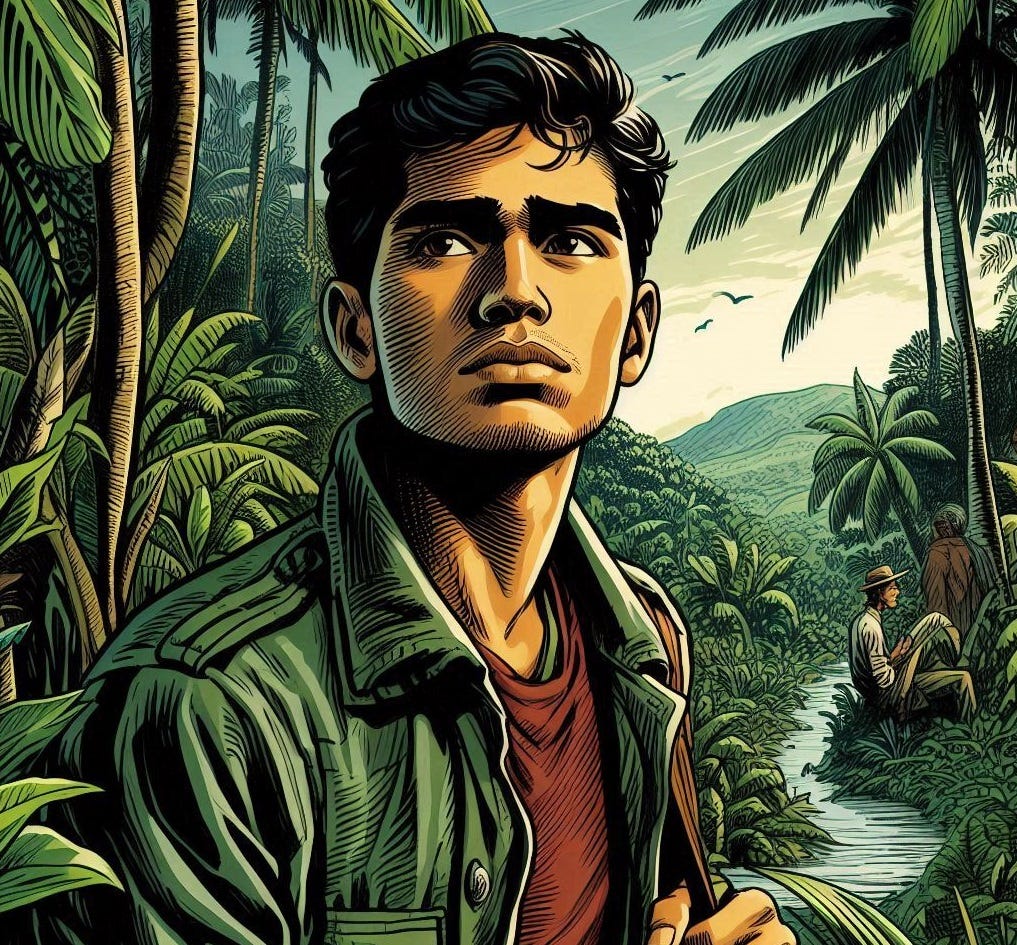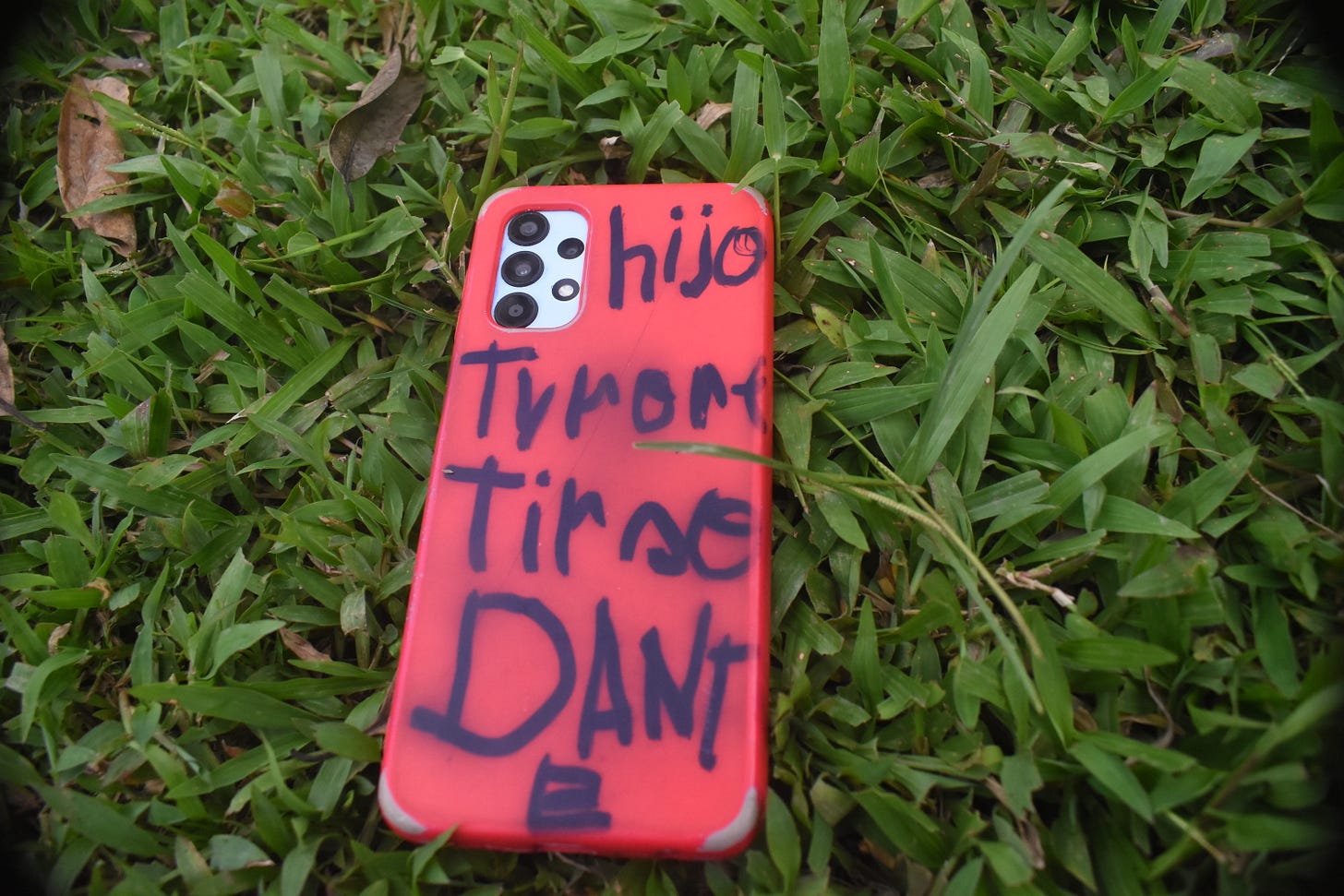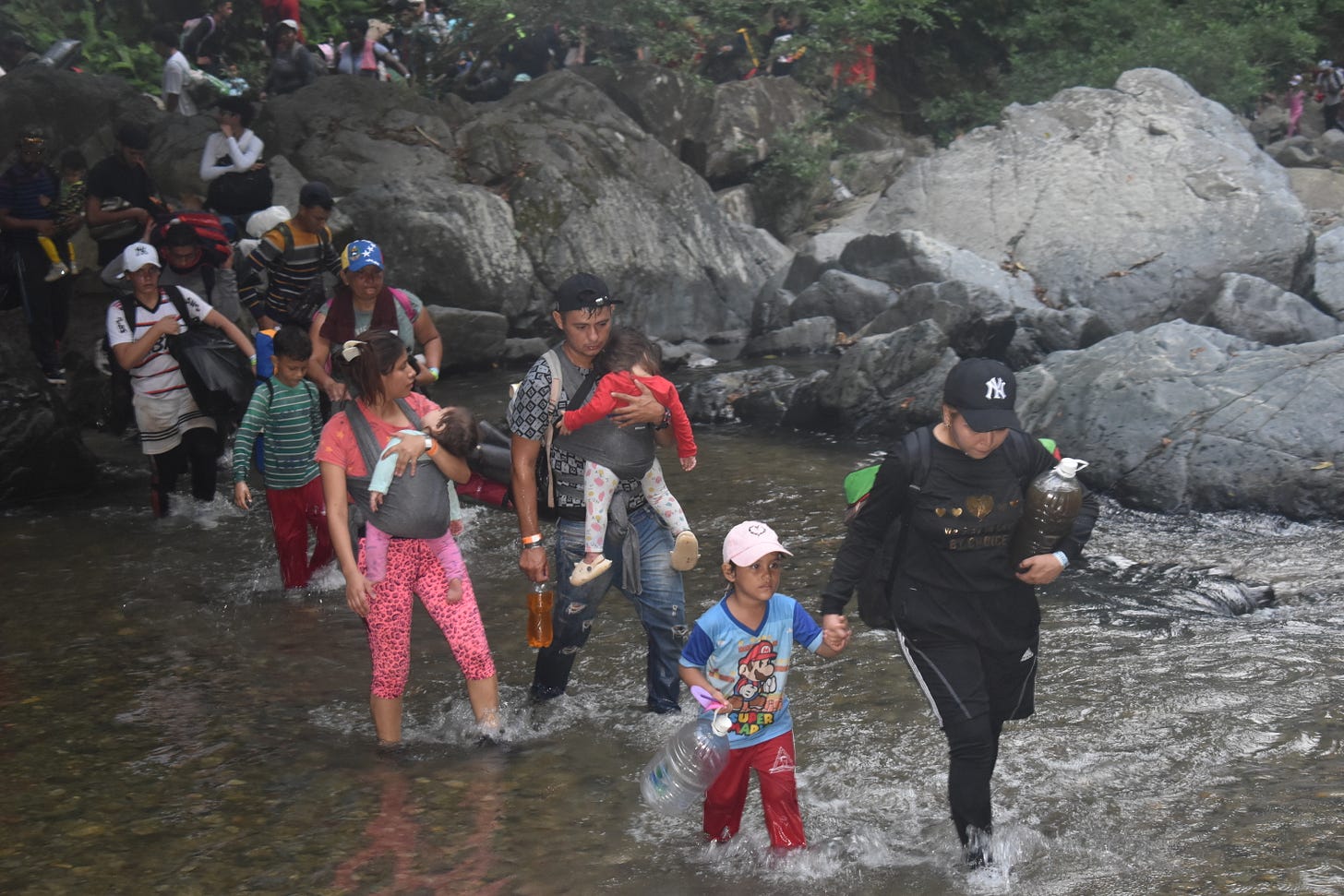Invisible Walls, the Darien Gap and fleeing a life of violence
Why do people choose to cross the most dangerous land migration route in the world? The world hasn't left them any other options
Why would a person travel across an entire continent along the most dangerous land migration route in the world, braving natural dangers, and not just criminal groups but corrupt law enforcement and migration officers as well?
What inspires a person to pack up their entire life, leaving behind friends and family, to seek a better future thousands of miles away despite the enormous legal, physical, and logistical barriers that have been erected to stop them?
The answers to those questions are as varied as the people making the journey.
For Jaime Chomba, an ex-chef who became a taxi driver after extortion payments imposed on his small restaurant in Guayaquil, Ecuador forced him to shutter the doors, it was one too many near death experiences.
Ecuador has seen a descent into crime in recent years, transforming from a once relatively tranquil oasis in Latin America into one of the most dangerous countries in the region— a phenomenon that has been centered in the crime-ridden port city of Guayaquil.
Jaime was kidnapped twice by gangs hoping to secure a ransom payment. His taxi was also stolen twice in two unrelated incidents. Both times he was lucky enough to recover it: once because the thief was shot to death while driving it in a confrontation with another gang, and a second time because the thief fled the vehicle at a police checkpoint just outside the city.
Jamie is originally from Loja, a small city in the south of the country, but moved to Guayaquil 6 years ago in search of better opportunities. “I originally wanted to become a police officer,” he told me at a migrant camp on the edge of the Darien Gap on the night before he departed on a trip through the jungle crossing that separates Panama from Colombia.

“I served in the military, so I thought it would be easy,” he said. “But then I realized the police in Guayaquil are just criminals too. There is no one on the side of the people there. Not really.”
After the second kidnapping, which he managed to escape by fleeing from a basement in the working class neighborhood where he was being held and running along corrugated tin rooftops as his captors pursued him, he decided he didn’t want his children growing up in an environment where violence is simply a detail of daily life.
“I want to go to New York City,” he said. “I want to be a chef again. I want to raise my children there.” He is traveling alone. He hopes to send for his family once he has established himself in the United States. His phone has the names of his children written on the back. “It’s so I remember to call them every chance I get,” he says.
“Do you think I will be able to claim asylum?” he asks. I get this question a lot. I’ve been covering borders for nearly a decade, and I never know how to honestly respond. Many of the people I meet aren’t able to. Even though I always give the people I meet my contact info, many more simply fall out of touch. Some are robbed. Some are assaulted. All are extorted by both criminals and migration officials.
“I’m not a lawyer,” I say after hesitating for a moment. “But to be honest I think it’s a little tough at the moment.” Biden has tightened asylum rules considerably, imposing policies that even Trump was unable to in an attempt to stem arrivals at the border. And migration judges tend to emphasize threats against someone’s life by state actors rather than criminal groups— even though in reality there is often little difference between the two.
It’s a lesson that Jaime already learned before arriving in Colombia by bus. But that didn’t stop Colombian police from charging him an “entry fee” at a migration checkpoint in Cali, even though no such fee exists, at least under Colombian law.
“After they searched my belongings, they told me I had to pay,” he said. “When I asked how much, one of the officers took all the cash from my wallet, saying ‘this is enough’.”
I stayed in touch with Jaime via phone messages throughout his journey. He was extorted twice more by migration officials in Nicaragua and Mexico. Robbed in Tapachula, Mexico, by other migrants, who were out of money and desperate to continue their journey north.
He was lucky in the Darien Gap, however. While other migrants spoke to me of seeing bodies or being robbed by local gangs on the Panamanian side, he crossed the jungle without serious incident.
Of all the hundreds of migrants we spoke with, I’m not sure why Jaime struck me especially. Perhaps it was his happy-go-lucky attitude, and cherubic face, as he told the stories of being robbed in Guayaquil with humor rather than tragedy. He seemed so positive. So excited about the new life that he believed lay ahead for him and his family in New York.
Why do people like him have to brave such dangers simply to build a better life? Policy, written by comfortable well-paid people thousands of miles away forces him and countless others into a migration route that kills hundreds, if not thousands every year.
And these “deterrence” policies don’t even deter, they just make migration more deadly. Of the more than half a million people who crossed the Darien Gap last year, I’m sure all of them would have rather bought a plane ticket. It’s not as if they spend less crossing the Darien.

Back before we started Pirate Wire Services, I lived on the Venezuelan-Colombian border in Cúcuta. I spent my days talking to migrants. I woke up every morning looking at the mountains of Venezuela that mark the border between the two countries— a place I could not visit—an invisible wall created by men and responsible for an incredible amount of suffering.
Muros Invisibles. That was the name of an earlier project about my time in those borderlands. Invisible Walls. Since then I’ve written hundreds of articles about migration and talked with thousands of migrants. One would think I’d be desensitized to their suffering after all of this time— a product of senseless policy I am powerless to change.
I am not. If anything I am more angered by the suffering caused by those barriers now than I have ever been. As I wrote a few years ago:
Borders are strange places. They dehumanize by definition. They are man-made constructs created to restrict the passage of people. They are gathering points for humans at their most desperate as well as magnets for miscreants seeking to exploit those who are at their most vulnerable.
Goods are trafficked across them by the ton every day- both legally and illicitly. They are populated by stern officials, travelers, refugees, scammers, thieves, merchants, and smugglers.
Borders underline the human need to classify some people as others. They are the invisible walls we create between nations, the outer limits of the tribe.
And the ones I work at are ugly, in every sense of the word.
The last I saw Jaime he was headed into the dense jungle of the Darien, smiling, as he did during all of the brief few hours we spent together. Excited. He made a peace sign in the photo I took of him before he walked off.
The last I heard of him he was in Mexico City. He had been robbed again. This time at knifepoint. He joked that no doubt he would lose his phone before he made it to the U.S. border, but that I shouldn’t worry. He had written my phone number down on a piece of paper in his wallet and would stay in touch.
Did he make it to New York? Is he alive? The messages I send him now go undelivered and unread. I like to think that he did. That he is working in a restaurant in Brooklyn, Queens, or Manhattan, and saving money to bring his family over.
I can’t be sure. But I am certain of one thing: I would be lucky to call him a neighbor there. His bravery, like most migrants I talk to, is inspiring. As is his attitude in the face of adversity. People like Jaime are what any community needs most— doers who are both kind and hard-working.
I will never understand why we build so many invisible walls to keep them out.
The Big Stories in LATAM
Initial hearings started Friday in the court case against ex-president Álvaro Uribe in Colombia. He is charged with fraud and witness tampering during an investigation into his ties to paramilitary forces. Prosecutors say he attempted to silence witnesses through a combination of bribes and threats. The case has dragged on for almost 7 years as Uribe has employed myriad legal tactics to delay prosecution and change the venue where he would have been prosecuted. He faces up to 12 years in prison if he is found guilty.
40,000 children crossed the Darien Gap in 2023, up 40% from the previous year according to a report this week from Unicef. More than 2,000 of them were unaccompanied. Migrants in the Gap often endure not just robbery, but sexual assault as well, according to data from Medicos Sin Fronteras, which was expelled from the Panamanian side for publishing data on sexual violence.
The Ship’s Log
Amy arrives Saturday in Bogotá to visit Daniela and Joshua! It will mark the first time the entire pirate crew has all been together in person. We have several piratical activities planned, and no doubt some adventures ahead. YAR!
In the meantime, Joshua was thinking about how he feels about PWS as we sail into our third year. It has been amazing. It’s a lot of work to keep this boat shipshape, but we’re almost at 2000 subscribers, which humbles him utterly. Despite the tempests, the weeks of doldrums, and the thousands of hours invested, we couldn’t be more grateful to be here writing, researching, traveling, and learning to bring you the stories we do.
And we’re still here! The good ship Capybara, battered as she is, is still afloat. Thank you so much for being a part of that.
Spanish Word of the Week
Cantinflear- to waffle or babble
As we have mentioned before, Spanish has a wealth of verbs that don’t exist in English. This verbal wealth is on full display with the word cantinflear. Literally translated it means “to waffle”, but that doesn’t do it justice.
Have you ever met anyone who could just talk, and talk, and talk for hours without actually communicating a single important idea? That person knows how to cantinflear. Sometimes, if the person has the gift of gab, it’s even entertaining!
But the word is also used, often to describe politicians, who speak in anodyne generalities, never describing concrete actions or taking firm positions. It’s long word salad that doesn’t actually convey anything.
We write a LOT for our jobs. In journalistic style the idea is to say as much as possible with as few words as you can.
Piratas don’t cantinflear! It is forbidden! Unless we’re really nervous in real life, say, speaking to the police.
But in that case it’s often better not to say anything at all!
Hasta pronto, piratas!






Very sad , all these stories of struggles to seek a better life away from the gangs. We know someone in the UK whom we help who fled Colombia over 20 years ago, because of all that.
I appreciate the difficulties that Jaime and other people like him have experienced. But what is your solution? If you believe in open borders be up front about it? Most people in the world dont, including from what I know in Ecuador. The background story you describe does not fit under traditional claims for asylum but has to do with lawlessness in his own country, as well as presumably better opportunity in the US, literally hundreds of millions, or more, would qualify under this scenario. What, if any, is the limit for the US, or other magnet countries to absorb tens of millions? Do you see any ultimate endpoint? Deterrence hasnt worked under Biden because his administration's overall policy, apart from any recent asylum policy changes on paper, sent the clear message that enforcement was not a priority at the start of his term, and this was amplified by the various multinational criminal organizations that benefit from the irregular migration process, and many are coming now because they fear if Trump wins in November, it will be more difficult. That fear shows deterrence works, it just depends on what the deterrence is. The great increase in irregular migration to the US did not happen as a force of nature. Under Obama the numbers were significantly smaller than under Biden. This shows that incentives and disincentives work, are they 100% effective?, of course not, like anything else.